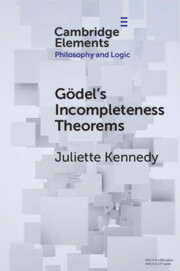Element contents
Gödel's Incompleteness Theorems
Published online by Cambridge University Press: 05 April 2022
Summary
Keywords
- Type
- Element
- Information
- Series: Elements in Philosophy and LogicOnline ISBN: 9781108981972Publisher: Cambridge University PressPrint publication: 14 April 2022
References
- 17
- Cited by

